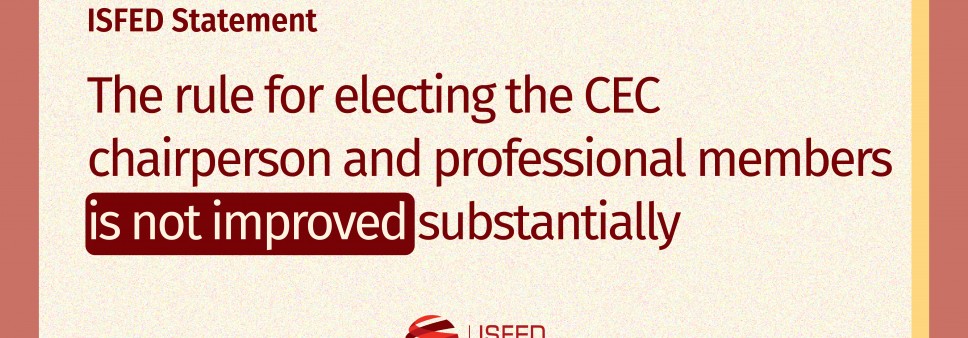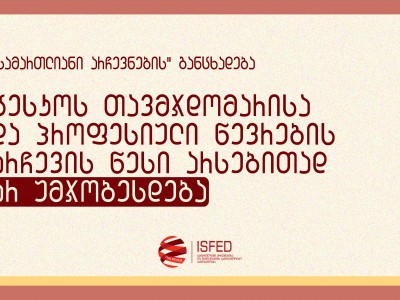The rule for electing the CEC chairperson and professional members is not improved substantially
On September 6, five parliamentary majority members submitted two draft laws to the parliament: the amendments to the Election Code of Georgia and the Rules of Procedure of the Parliament of Georgia. These draft laws, if adopted, will once again change the selection rule for electing the members of the Central Election Commission of Georgia (CEC).
The initiated changes do not substantially solve the main problems in electing the CEC chairperson and professional members. In particular, the chairperson of the Parliament of Georgia, similar to the rules adopted by the previous amendments, will still select candidates for CEC membership/chairpersonship and nominate them to the parliament, which, in turn, will be able to elect the candidates for a full term of 5 years with a simple majority. These factors weaken the CEC's independence and strengthen one party's influence over the election administration.
In case of adopting the presented changes, instead of a simple parliamentary majority (76 votes), the support of 3/5 of the members of the parliament (90 votes) will be required to elect the candidates for the position of the CEC chairperson and professional members for a full term (5 years). If candidates cannot be selected with a majority of 3/5, the parliament will be able to elect them for a full term, with 76 votes, with two attempts. If a sufficient number of CEC members is still not elected, the chairperson of the Parliament of Georgia will send the list of persons participating in the open competition for CEC membership and the relevant competition documentation to the President of Georgia. Within one week of receiving the mentioned list and the documentation, the President will be authorized to appoint CEC members to the remaining or fewer vacant positions.
One of the 12 recommendations issued by the European Commission to Georgia concerning obtaining the EU membership candidate status mentions the reform of the electoral legislation. The European Commission expects Georgia to reflect the recommendations of the Venice Commission and the OSCE Office for Democratic Institutions and Human Rights (OSCE/ODIHR) in its election legislation, which, in turn, derives from international standards and best international practices for conducting elections. One of the main aspects of this reform is the composition of the CEC and raising trust in it. This is evidenced in the June 22 oral remarks of the European Commissioner for Neighborhood and Enlargement - Oliver Varhelyi. According to the comments, the legislative changes of June 13 related to the appointment procedure of the CEC chairperson should be reversed. These changes were also negatively assessed by the International Society for Fair Elections and Democracy.
In the explanatory notes of the draft laws, it is stated that the basis of the presented change is the oral remarks of the European Commissioner for Neighborhood and Enlargement published on June 22, 2023, on the progress of implementing 12 priorities prescribed for Georgia by the June 17, 2022, assessment. Despite the declared intentions of the initiators, the submitted draft laws do not substantially change the procedure of electing the CEC members. The possibility of electing the CEC chairperson and/or professional members with a simple parliamentary majority will remain, which will not motivate the ruling party majority to reach a political consensus on candidates.
Essential and reasonable participation of the President's institute in electing the CEC members will not be ensured. This stems from removing the President from the candidate selection stage and leaving the selection competition commission to the chairperson of the Parliament. First, the probability that the parliamentary majority will not choose the desired candidate even after three votes and that the President will be given the right to appoint CEC members is low. Even if this happens, the power of the President to solely appoint CEC members is inconsistent with the legal-political logic of the separation of powers. In addition, this model will not contribute to reaching a consensus among parliamentary parties or increase trust in the CEC members.
Based on the stated, the presented initiative may be considered only a formal change, which continues the trend of the ruling party having a total concentration of power and maintaining its influence on the election administration.
Accordingly, we once again call on the Parliament of Georgia to take into account the conclusions of the OSCE/ODIHR and the Venice Commission of the Council of Europe, as well as the recommendation of the European Commissioner for Neighborhood and Enlargement, and make the procedure for electing the CEC chairperson and professional members consistent with the principles provided for in the political agreement of April 19, 2021.


